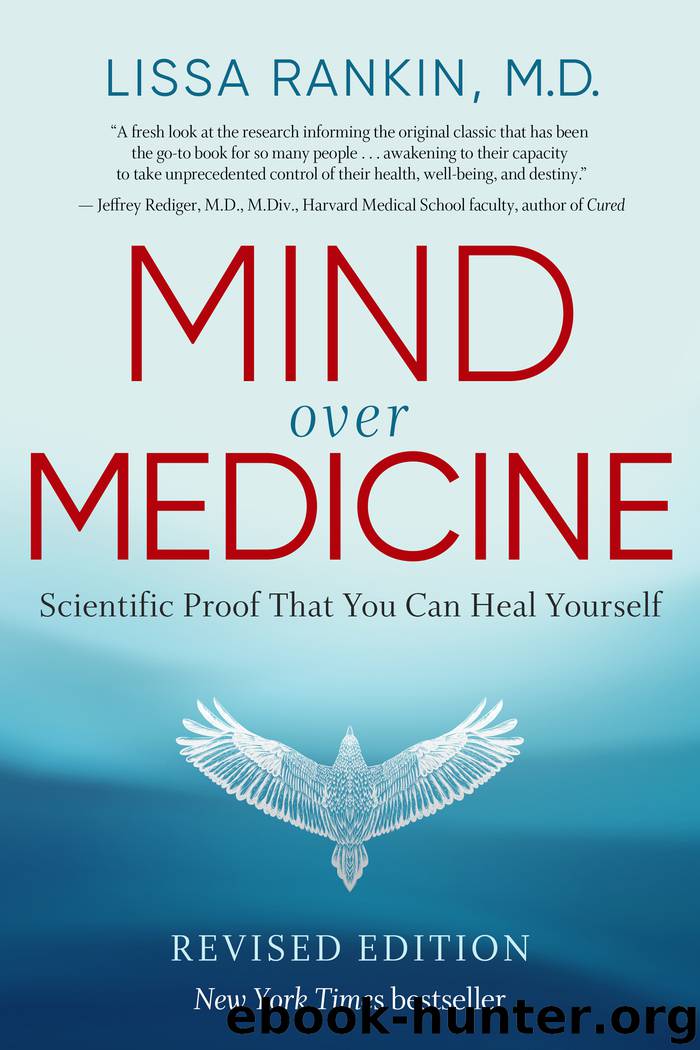Mind Over Medicine--REVISED EDITION by Lissa Rankin M.D

Author:Lissa Rankin, M.D.
Language: eng
Format: epub
Publisher: Hay House
Published: 2020-04-05T16:00:00+00:00
Are Optimists Healthier than Pessimists?
Many years later, Martin Seligman, the father of positive psychology and author of Learned Optimism, was seeking a way to study whether optimists live longer than pessimists. For many years, he had been researching people’s explanatory styles, how they explain unfortunate or fortunate events in their lives. As it turns out, the difference between optimists and pessimists lies in how permanent, pervasive, and personal they perceive good and bad events to be.
Because the pessimist views the bad event as permanent (“It’ll always be this bad”), pervasive (“This is going to ruin everything”), and personal (“It’s all my fault”), hopelessness ensues. When you make permanent, pervasive, and personal explanations for the painful events that inevitably happen to everyone, you pave the way for chronic unhappiness and, ultimately, illness. Pessimists also believe that events they judge as bad are the result of their own failure. Good events, on the other hand, they believe to be temporary, specific, and outside of their control. Optimists, meanwhile, are a whole different breed. Optimists perceive bad events to be temporary, specific, and external, while they believe good events are permanent, pervasive, and the result of their own internal awesomeness.
Seligman and his colleagues sought out the Grant Study data to see if they could identify any correlations between explanatory style and disease risk. First, they had to determine whether optimism and pessimism are stable across a lifetime. Is it “once an optimist, always an optimist”? Or do people change?
What they found is that, while optimism may change over time, the way people explain painful life events tends to remain fixed throughout their lives unless something significant changes and someone shifts explanatory styles. I’ll discuss what you can do to become more optimistic and enjoy the health benefits that accompany optimism at the end of this chapter.
To see if trends in explanatory styles could be linked to health outcomes, Seligman and his partner, Chris Peterson, took a crack at the Grant Study data. What they found was that by the age of 45, the Grant Study pessimists were already less healthy than the optimists. The pessimistic men had started to get sick younger and more severely than the optimistic men. And by the age of 60, pessimists were significantly sicker.11
Turns out optimistic patients recover better from coronary bypass surgery, enjoy healthier immune systems, and live longer. They fare better when suffering from conditions such as cancer, heart disease, and kidney failure.12 Optimists also live longer than pessimists. People with a positive outlook are 45 percent less likely to die within a specified period of time from all causes than negative thinkers (and 77 percent less likely to die from heart disease).13 A positive attitude also affects our ability to ward off infection. In one study, healthy volunteers were interviewed about attitudes and then exposed to common cold and influenza viruses. Those with sunny dispositions were more resilient than those without.14
Other studies examining optimism versus pessimism followed. Harvard psychologist Laura Kubzansky, who studies optimism, tracked
Download
Mind Over Medicine--REVISED EDITION by Lissa Rankin M.D.epub
This site does not store any files on its server. We only index and link to content provided by other sites. Please contact the content providers to delete copyright contents if any and email us, we'll remove relevant links or contents immediately.
Inner Engineering: A Yogi's Guide to Joy by Sadhguru(6785)
The Power of Now: A Guide to Spiritual Enlightenment by Eckhart Tolle(5746)
Fear by Osho(4727)
Ikigai by Héctor García & Francesc Miralles(4238)
The Art of Happiness by The Dalai Lama(4125)
The Ultimate Bodybuilding Cookbook by Kendall Lou Schmidt(3934)
Yoga Therapy by Mark Stephens(3742)
The Little Book of Hygge by Meik Wiking(3680)
The Healing Self by Deepak Chopra(3568)
Why Buddhism is True by Robert Wright(3446)
The Hatha Yoga Pradipika (Translated) by Svatmarama(3320)
Being Aware of Being Aware by Rupert Spira(3272)
Shift into Freedom by Loch Kelly(3192)
Wild Words from Wild Women by Stephens Autumn(3147)
Work Clean by Dan Charnas(3114)
Happiness by Matthieu Ricard(3040)
More Language of Letting Go: 366 New Daily Meditations by Melody Beattie(3017)
Yoga Body & Mind Handbook by Jasmine Tarkeshi(2873)
Why I Am Not a Feminist by Jessa Crispin(2747)
